Octolane Alternatives
Explore 10 alternatives to Octolane. We provide a detailed comparison to inform your decision on which platform to choose next.

Many teams choose Octolane for good reasons. The tool performs well when you need to track website visitors. It gives clear data to help understand user behavior, a valuable function for many businesses.
But like any tool, it has limits. Some users report a complex interface or integration issues, which can cause delays. We analyzed the best alternatives based on G2 reviews, comparing their pros and cons to help you shortlist your options. Let's get started.
Consider 11x for Your Sales Team
For teams that want digital workers for sales, 11x is an option to review. It uses autonomous agents for tasks like outreach and follow-ups. The result is more time for your sales staff to focus on deal closures and client relationships.
11x is a GTM platform where we use AI agents to manage the sales process. Our agent Alice finds prospects, performs outreach on email and LinkedIn, and updates your CRM. A second agent, Julian, qualifies inbound leads and books meetings for your team.
We replace separate tools for data enrichment, outreach, and email warmup. 11x unifies these functions into a single platform, so you do not need multiple point solutions.
Octolane Alternatives
The following section reviews top Octolane alternatives in detail. We compare pricing, main features, and the pros and cons of each tool against Octolane to inform your decision.
1) ZoomInfo SalesOS
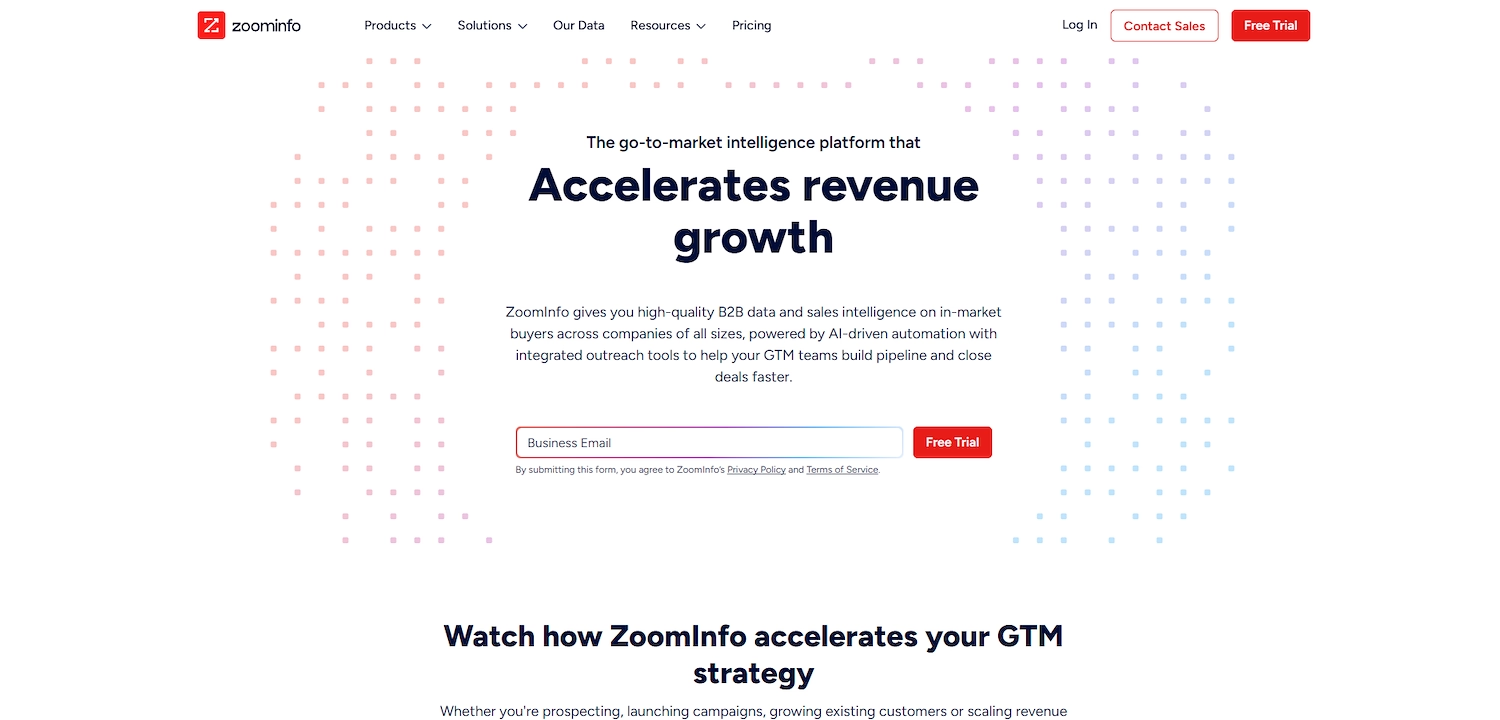
ZoomInfo SalesOS is a go-to-market intelligence platform for B2B firms. It unifies contact and company data with buyer-intent signals to help teams find and connect with customers. The system provides tools to build lead lists with verified contact information and identify accounts that show purchase intent.
For website visitor tracking, it can turn anonymous page views into pipeline opportunities.
ZoomInfo SalesOS's Main Features
- Automates phone and email outreach to connect with prospects.
- Analyzes call and meeting interactions with its conversation intelligence tool, Chorus.
- Uncovers potential customers and ideal customer profiles using predictive modeling.
- Appends and refreshes customer relationship management data in real time.
How ZoomInfo SalesOS Compares to Octolane
Average Review score: 4.5/5 stars based on 8,738 G2 reviews.
- ZoomInfo SalesOS offers a more extensive database with company and contact details, while Octolane primarily tracks website visitors.
- It includes sales engagement tools for outreach and conversation analysis, features not present in Octolane.
- The platform uses AI to guide sales actions and predict ideal customers, offering a different approach compared to Octolane's visitor identification.
- This tool provides data cleaning and enrichment to maintain CRM accuracy, a function separate from Octolane's core purpose.
Potential Drawbacks of ZoomInfo SalesOS
- ZoomInfo SalesOS provides many features beyond visitor tracking. For teams that only need to identify website visitors, the platform can feel complex compared to Octolane's focused function.
- The tool may have a higher cost and a longer setup time. Some data suggests an implementation period of about one month, which differs from more specialized tools like Octolane.
- Some users report occasional issues with data accuracy. Contact or company information can sometimes be outdated, which may require extra verification from your team.
Pricing and Cost-Effectiveness
ZoomInfo SalesOS does not list pricing publicly; costs are provided on a quote-by-quote basis. The platform's perceived cost is high, which aligns with its extensive feature set compared to more focused tools like Octolane. For a detailed quote, you should contact the ZoomInfo sales team.
2) Apollo.io
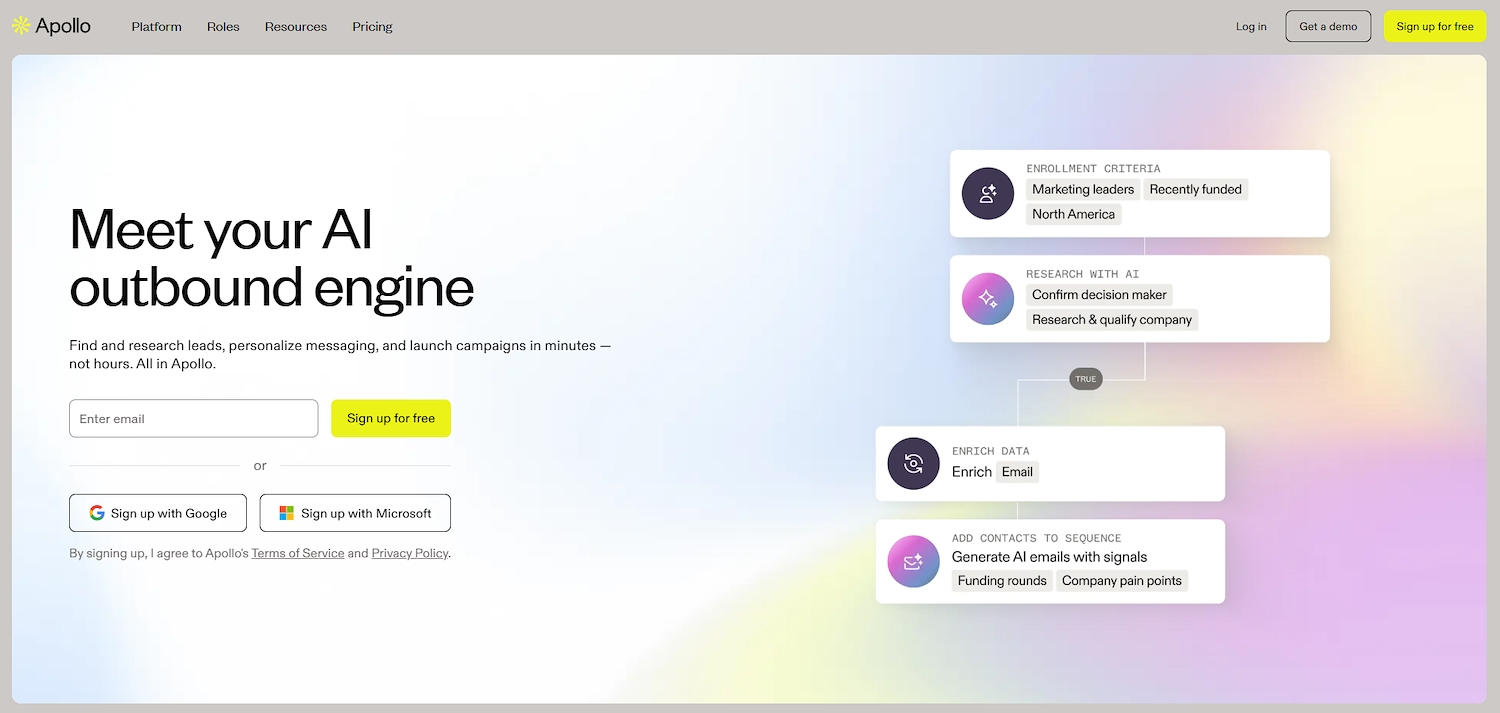
Apollo.io is a sales intelligence platform for go-to-market teams. It offers a database of contacts and companies, combined with tools for sales engagement and analytics. The system helps users find prospects and automate outreach.
Its website visitor tracking feature identifies anonymous companies on your site. This function turns web traffic into actionable leads for sales departments and connects online interest to revenue opportunities.
Apollo.io's Main Features
- Offers a contact and company database to build prospect lists.
- Automates outreach sequences for sales engagement.
- Includes an analytics suite to track campaign performance and results.
How Apollo.io Compares to Octolane
Average Review score: 4.7/5 stars based on 8,904 G2 reviews.
- Apollo.io provides access to a database with over 210 million contacts, a feature not central to Octolane's visitor identification focus.
- The platform includes sales engagement tools to automate outreach sequences, a function separate from Octolane's core purpose.
- It combines data, engagement, and analytics into one system, which offers a broader scope than Octolane's specialized function.
- This tool offers lead enrichment and validation to improve data quality, which is distinct from Octolane's ability to identify anonymous website visitors.
Potential Drawbacks of Apollo.io
- Some users find Apollo.io complex due to its wide range of features. In comparison, Octolane focuses only on visitor tracking, which can make it simpler for teams to learn and use for that specific task.
- The platform's visitor identification is one of many tools in a large system. Teams that require very detailed behavioral analytics may find Octolane's specialized function offers deeper insights compared to an all-in-one solution.
- Its large contact database sometimes contains outdated information that requires manual verification. This issue might be less common with a tool like Octolane, which concentrates on real-time website activity rather than static contact data.
Pricing and Cost-Effectiveness
Apollo.io offers transparent pricing, including a free plan, a Basic plan at $49 per user per month, and a Professional plan at $79. This tiered structure provides predictable costs, which differs from tools that may require a custom quote. For the most current pricing, visit Apollo.io's official website.
3) Clearbit
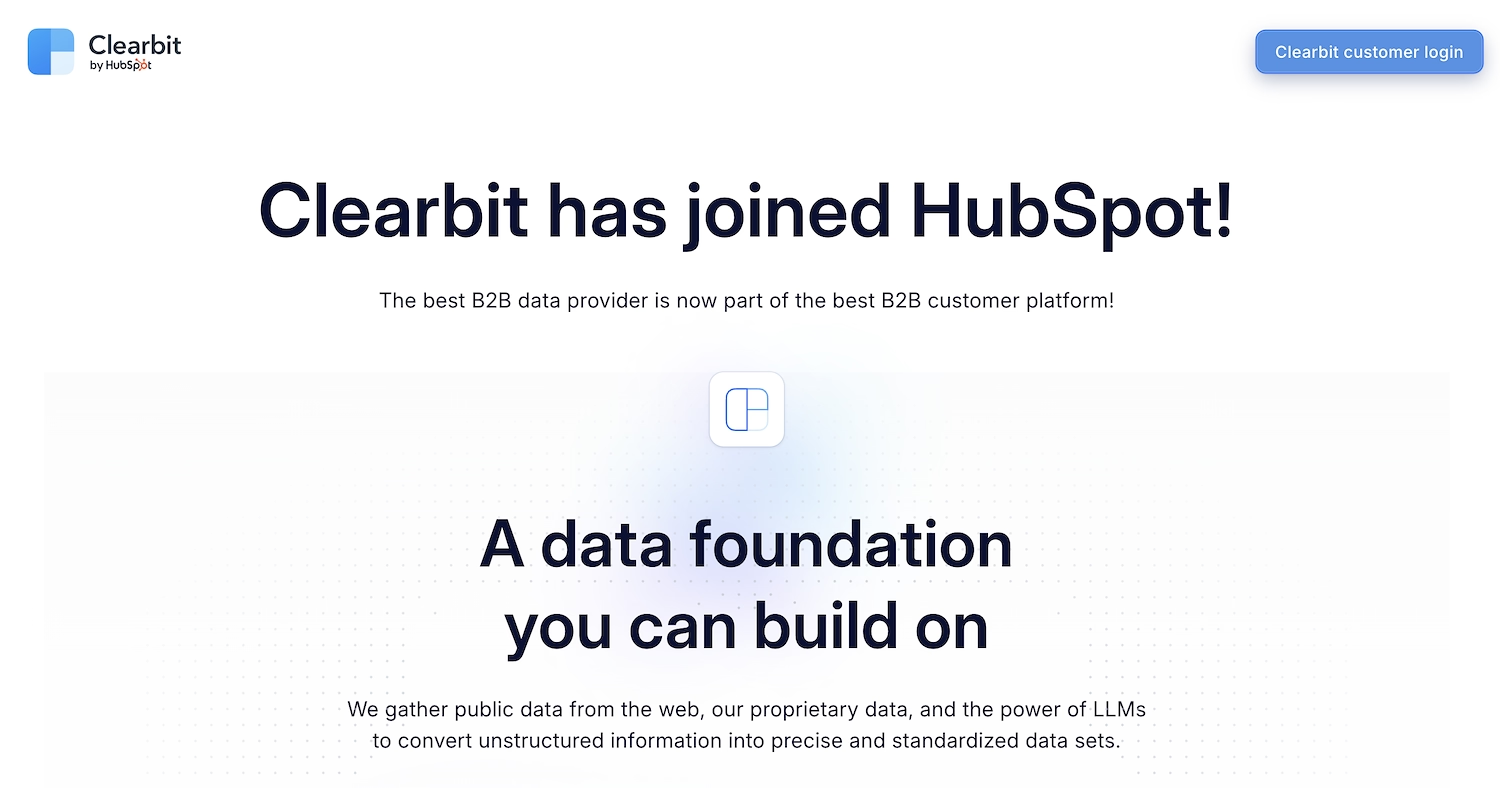
Clearbit, now part of HubSpot, is a B2B data provider. It collects public and proprietary data to create standardized datasets. The service de-anonymizes website traffic to identify companies that visit your site and match your ideal customer profile. This information helps teams prioritize outreach to accounts that show intent to buy.
Clearbit's Main Features
- Adds firmographic and demographic details to enrich lead, contact, and account records.
- Provides data for real-time lead scoring and routing using industry classifications and corporate hierarchy.
- Shortens web forms by automatically enriching data, which can increase conversion rates.
- Aggregates public and proprietary data with LLM processing to build standardized B2B datasets.
How Clearbit Compares to Octolane
Average Review score: 4.4/5 stars based on 626 G2 reviews.
- Clearbit enriches lead records with over 100 data points, like company size and technology. This provides more context compared to Octolane, which focuses on identifying the visitor.
- It shortens web forms by automatically filling in known fields for visitors. This function, not found in Octolane, can help increase lead conversion rates.
- The tool offers deep integration with CRMs like HubSpot to automate lead scoring and routing. This is a different approach from Octolane, which primarily identifies and sends visitor data to a CRM.
- This platform uses a combination of public data and machine learning to keep its B2B datasets current, which differs from Octolane's focus on real-time website activity.
Potential Drawbacks of Clearbit
- Some teams may find the platform's extensive data enrichment features distracting. If the main goal is simple visitor tracking, Octolane offers a more direct solution without the extra layers of data points.
- The tool's setup can take time. Some data suggests an implementation period of about one month, which is different from more specialized tools like Octolane that may have a quicker start.
- Some users report that contact or company information can be outdated. This may require extra verification from your team, a step that might be less frequent with a tool focused only on real-time visitor activity like Octolane.
Pricing and Cost-Effectiveness
Clearbit's pricing is quote-based and perceived as high, which aligns with its comprehensive feature set. For the most accurate and up-to-date pricing information, we recommend visiting Clearbit's official website.
4) Cognism
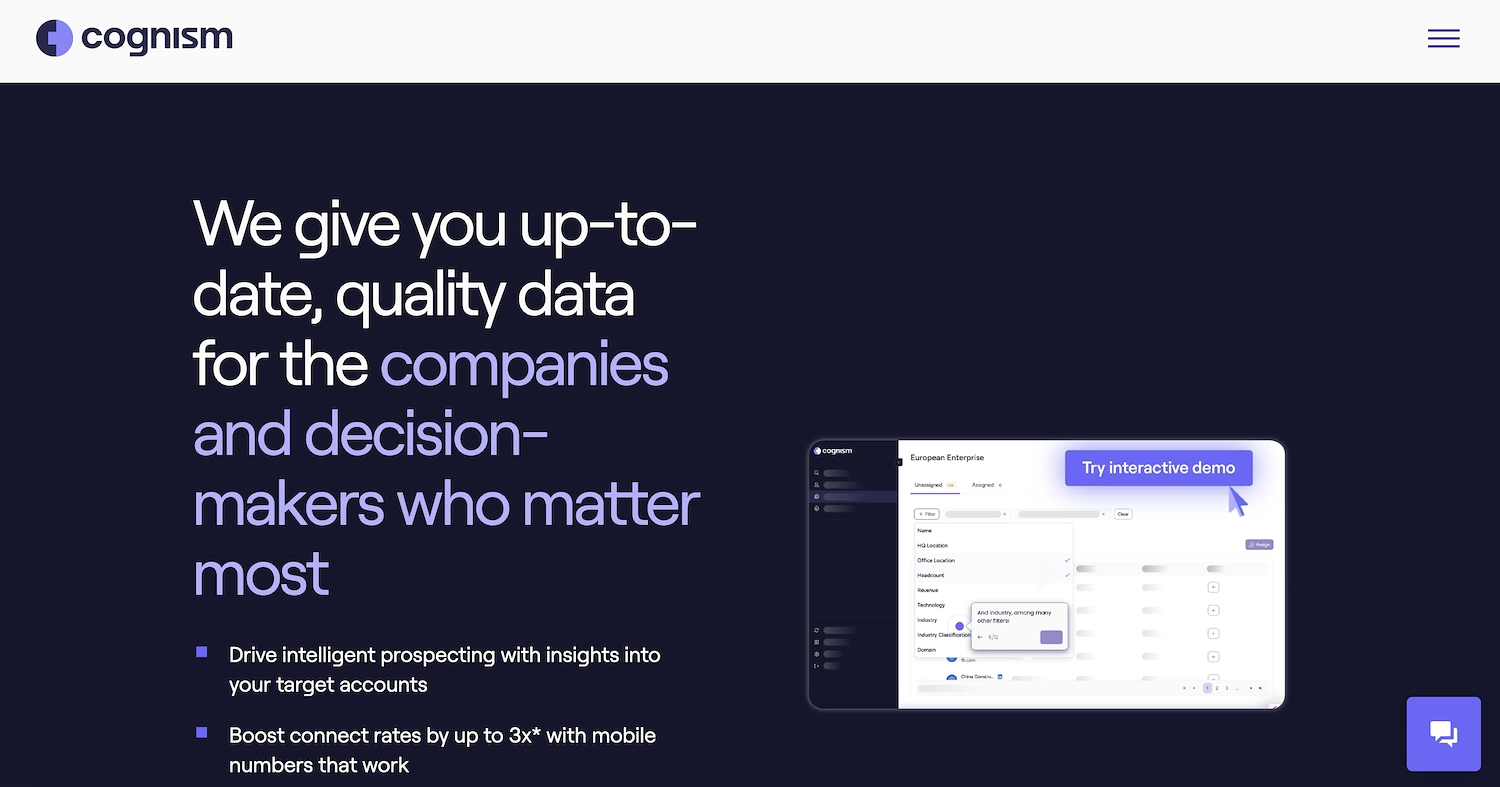
Cognism is a sales intelligence platform that provides B2B data. Sales teams use it to find and engage prospects. The system identifies anonymous companies on your website, which turns traffic into leads. This function helps teams focus on accounts that show interest.
It also offers data enrichment to keep CRM records accurate for outreach.
Cognism's Main Features
- Supplies phone-verified, human-checked numbers, known as Diamond Data®, with strong coverage in the UK and EMEA.
- Surfaces timely buying signals from hiring trends, funding rounds, and technographic changes for outreach.
- Enriches CRM records in bulk through CSV or API to complete and refresh contact data.
- Offers a database of senior-level decision-makers screened against Do-Not-Call lists for compliant outreach.
How Cognism Compares to Octolane
Average Review score: 4.6/5 stars based on 1,033 G2 reviews.
- Cognism supplies phone-verified contact data, which offers a higher level of accuracy for outreach compared to Octolane's focus on company-level visitor identification.
- The platform identifies timely buying signals, such as company funding or hiring changes. This gives more context for outreach than Octolane, which primarily tracks website visits.
- It offers bulk data enrichment for CRMs to keep records complete and current. This is a different function from Octolane, which sends new visitor information to a CRM.
- This tool checks its contact database against global Do-Not-Call lists. This provides a layer of compliance for sales outreach that is separate from Octolane's website tracking function.
Potential Drawbacks of Cognism
- Cognism is a broad platform with many tools. For teams that only need to identify website visitors, its features can feel complex compared to Octolane's single focus.
- The tool's setup can take about a month, according to some user data. This implementation period might be a factor for teams that look for a quicker start, which a specialized tool like Octolane may offer.
- Its main strength is a large contact database, but some users report that this data can be outdated. This is a different approach from Octolane, which concentrates on identifying companies from live website traffic.
Pricing and Cost-Effectiveness
Cognism's pricing is quote-based and perceived as high, which aligns with its extensive feature set. For the most accurate and up-to-date pricing information, we recommend visiting Cognism's official website.
5) Seamless.ai
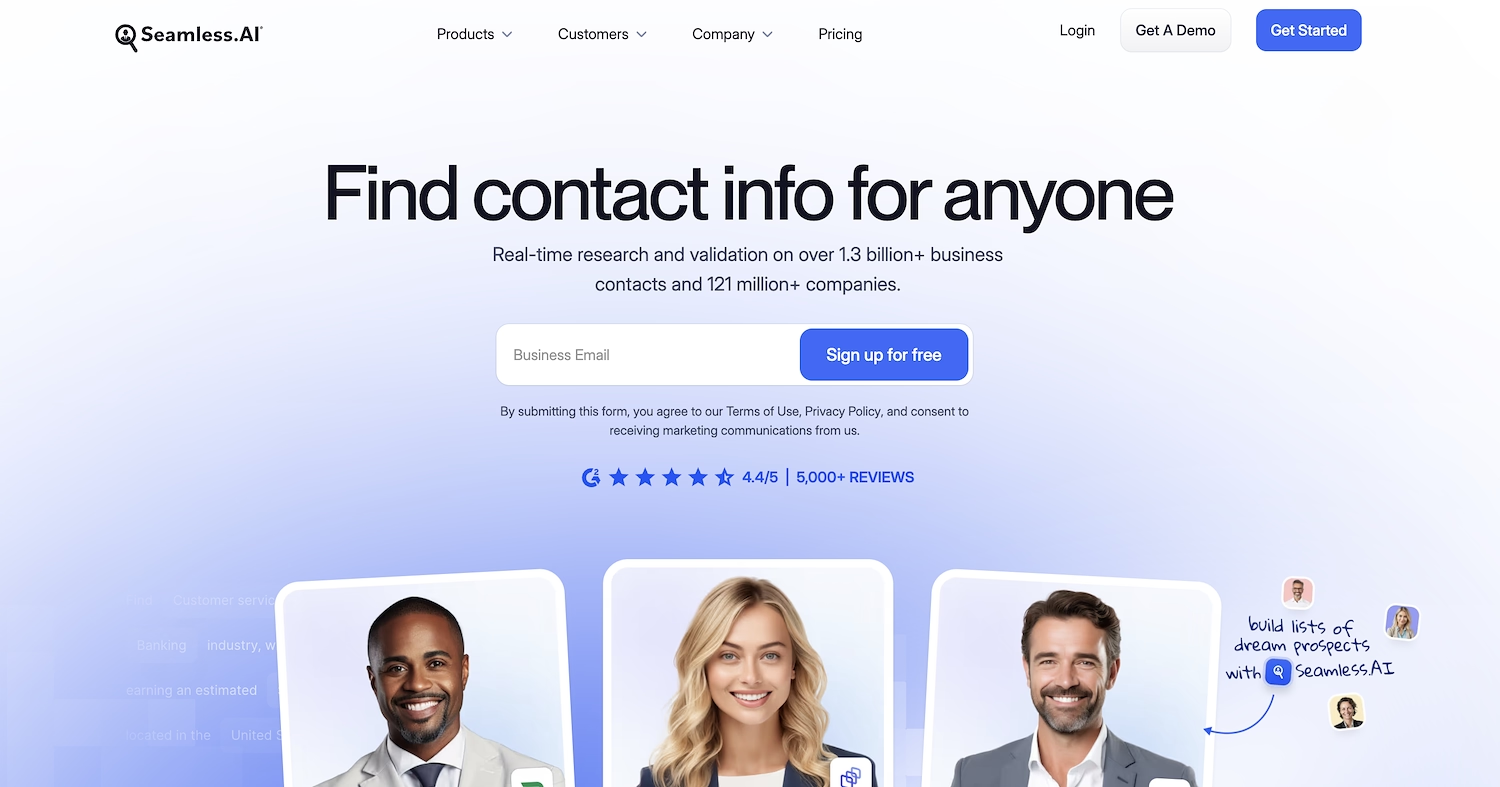
Seamless.ai is a real-time search engine for B2B sales leads. The platform helps sales professionals find verified contact information for prospects. For website visitor tracking, it identifies anonymous companies on your site. This function provides sales teams with a list of interested accounts based on their website activity.
Seamless.ai's Main Features
- Searches a database of over 1.3 billion contacts and 121 million companies to find profiles with email and phone data.
- Detects and sends alerts when prospects or customers change roles, then captures their new contact information.
- Generates research and personalized messaging for individual prospects using AI.
- Identifies prospects who show intent signals, indicating they are ready to make a purchase.
How Seamless.ai Compares to Octolane
Average Review score: 4.4/5 stars based on 5,067 G2 reviews.
- Seamless.ai provides a real-time search engine with access to over 1.7 billion contacts. This offers a different approach compared to Octolane, which identifies companies from your existing website traffic.
- The platform sends alerts when contacts change jobs, helping keep sales data current. This is a proactive data maintenance feature not found in Octolane's visitor tracking function.
- It uses AI to generate personalized messages for outreach. This adds a sales engagement layer, while Octolane focuses on providing the initial lead identification.
- This tool identifies broader buyer intent signals beyond just website visits. This gives sales teams more context for outreach compared to Octolane's focus on site activity.
Potential Drawbacks of Seamless.ai
- Seamless.ai is a large platform with many tools. Teams that only need to identify website visitors might find Octolane's single-purpose design simpler to use for that specific task.
- Its database is very large, but some users report that contact information can be outdated. This may require extra verification, a step that is different from Octolane's focus on live visitor identification.
- The setup process can take time. Some data suggests an implementation period of about one month, which differs from more specialized tools like Octolane that may offer a quicker start.
Pricing and Cost-Effectiveness
Seamless.ai provides pricing on a quote-by-quote basis, a different model from tools that offer tiered plans. The platform's perceived cost is high, aligning with its extensive feature set. For a detailed quote, contact the sales team through the Seamless.ai website.
Get Started With 11x
For teams interested in digital workers for sales, 11x offers a platform where AI agents manage outreach and lead qualification. This approach lets your sales staff focus on deal closures. Schedule a demo to see how the platform can support your sales process.
At 11x, our AI agents manage your sales process. Alice finds prospects and handles outreach, while Julian qualifies leads and books meetings. We unify data, outreach, and email warmup into one platform, replacing multiple tools in your GTM stack.
Book a demo to see how our AI agents can support your sales process.
6) Lusha
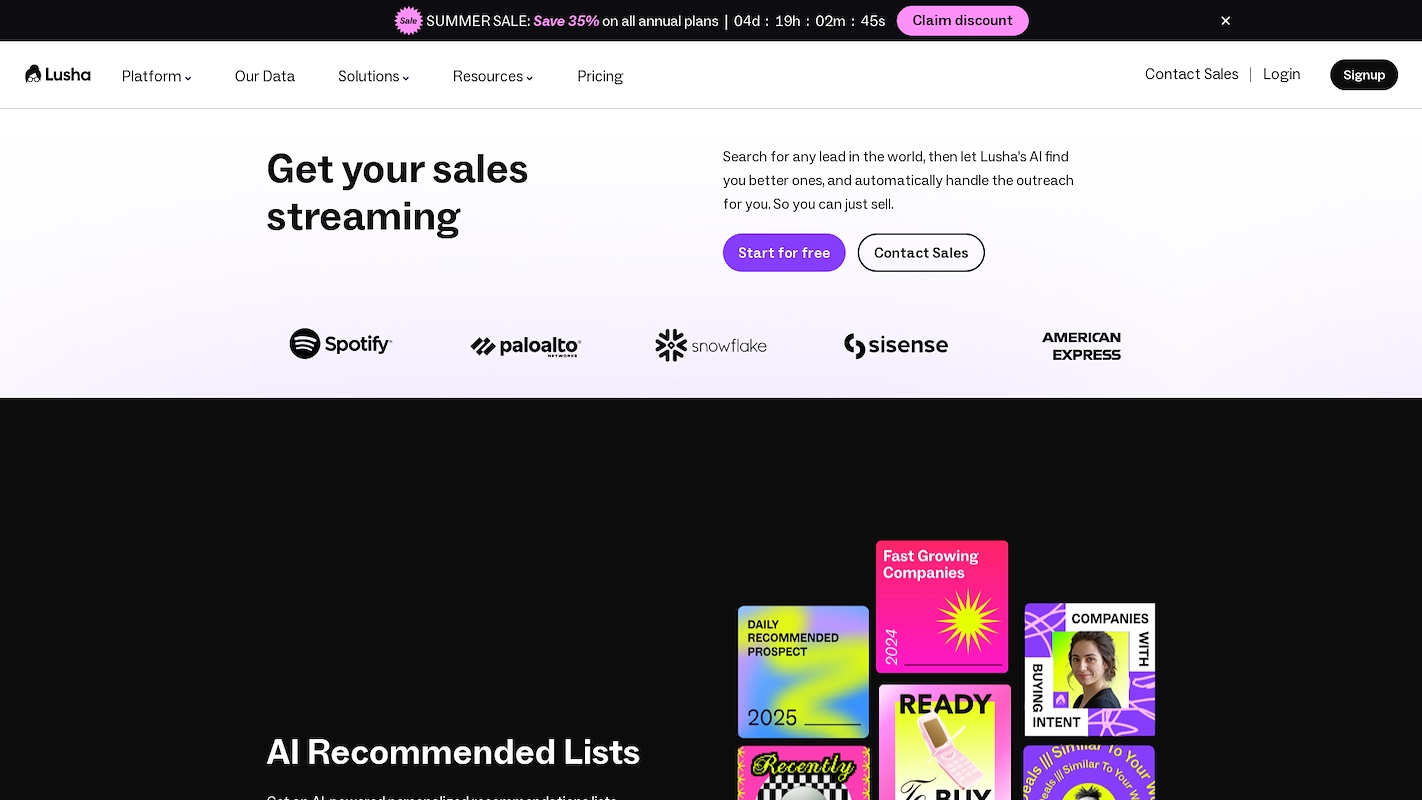
Lusha is a sales intelligence platform that offers B2B contact and company data. Teams use the service to find information about prospects for sales outreach. The platform includes a feature to identify anonymous companies that visit a website, which helps turn traffic into potential leads.
Lusha's Main Features
- Provides daily, ICP-based lists of companies and decision-makers from its recommendation engine.
- Automates and personalizes email outreach sequences with AI-generated copy.
- Records and analyzes sales meetings to provide conversation intelligence.
- Offers B2B data certified for GDPR, CCPA, and ISO 27701 & 27001 compliance.
How Lusha Compares to Octolane
Average Review score: 4.3/5 stars based on 1,516 G2 reviews.
- Lusha provides AI Prospect Playlists that automatically create lead lists based on your ideal customer profile. This differs from Octolane, which identifies companies already on your website.
- It offers B2B data certified for GDPR and CCPA compliance. This provides a specific layer of security for outreach that is distinct from Octolane's visitor tracking function.
- The platform records and analyzes sales meetings to provide conversation intelligence. This feature is not available in Octolane, which focuses on identifying website visitors.
- This tool automates email outreach with AI-generated copy. In comparison, Octolane identifies potential leads from web traffic but does not include tools for direct engagement.
Potential Drawbacks of Lusha
- Lusha's platform includes many tools for the sales cycle. For teams that only need to identify website visitors, this can be more complex to navigate than Octolane's focused solution.
- Some users report that its contact data can be outdated, which may require extra verification. This is different from Octolane, which identifies companies based on live website activity.
- The tool's CRM integration sometimes has gaps, according to user reviews. This might require manual data work, unlike a specialized tool that focuses on sending visitor data to a CRM.
Pricing and Cost-Effectiveness
Lusha provides transparent pricing with a free plan, a Pro plan at $36 per user per month, and a Premium plan at $59. This tiered structure offers predictable costs, unlike tools that may require a custom quote. For details on its enterprise Scale plan, visit Lusha's official website.
7) LeadIQ
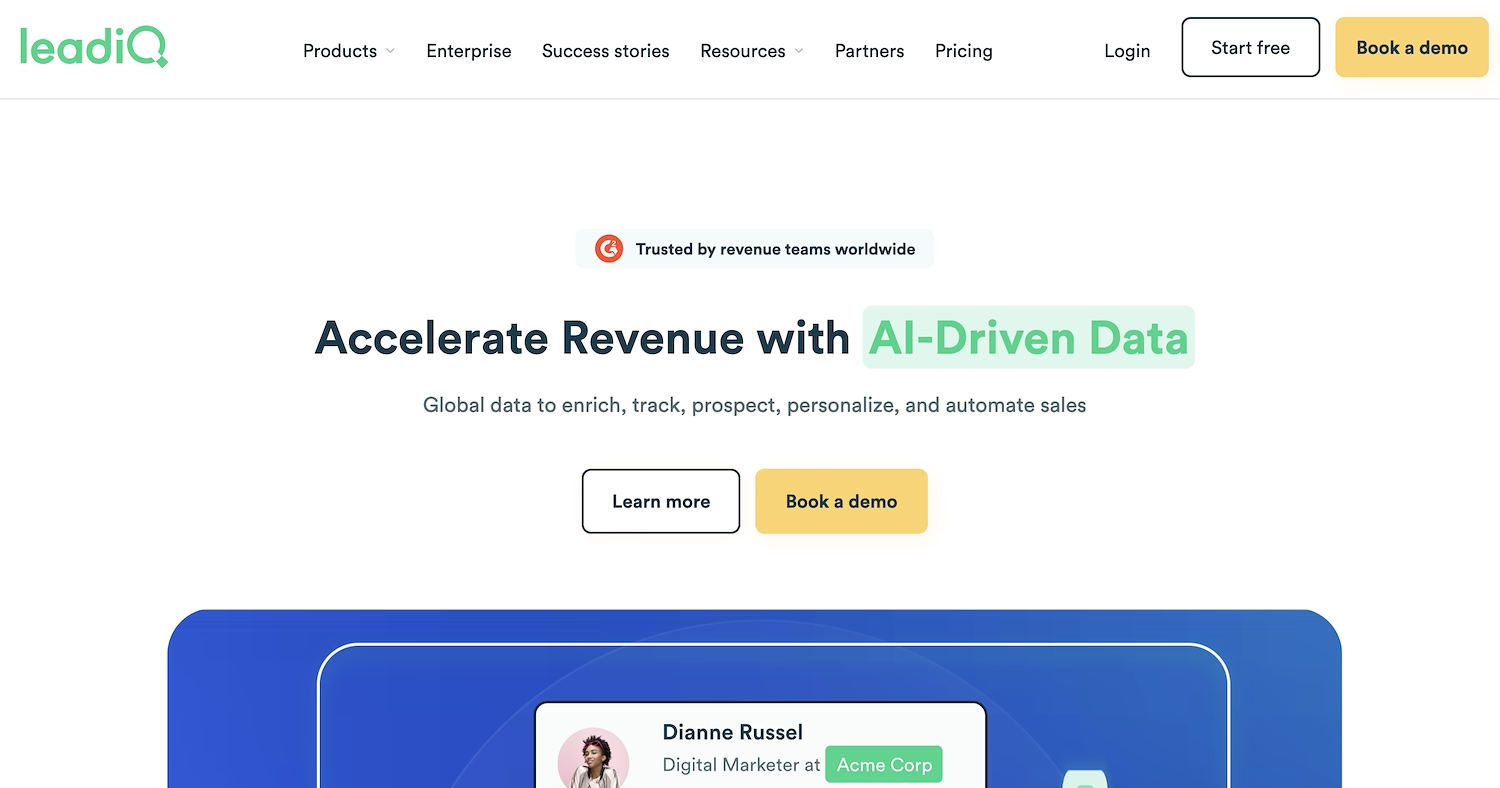
LeadIQ is a sales prospecting platform that helps teams find and capture contact data. Sales departments use it to build account lists for outreach. The system identifies anonymous companies that visit a website, which turns web traffic into potential accounts.
LeadIQ's Main Features
- Generates personalized outreach messages using its AI tool, Scribe.
- Tracks job changes and promotions automatically to alert teams when contacts move to new roles.
- Captures contact data from LinkedIn with one click and syncs it to CRM and engagement tools.
- Surfaces buying signals like funding rounds and G2 intent data to identify timely opportunities.
How LeadIQ Compares to Octolane
Average Review score: 4.2/5 stars based on 1,097 G2 reviews.
- LeadIQ generates personalized outreach messages with its AI tool, Scribe. This is a feature for sales engagement, while Octolane focuses on identifying the visitor.
- It automatically tracks job changes to keep contact data current. This is different from Octolane, which identifies companies based on live website activity.
- The platform captures contact data from LinkedIn with one click. This provides a direct way to build prospect lists, unlike Octolane's method of identifying anonymous site visitors.
- This tool identifies buying signals like funding rounds and G2 intent data. This gives more context for outreach compared to Octolane, which primarily tracks website visits.
Potential Drawbacks of LeadIQ
- LeadIQ is a broad platform with many features. For teams that only need visitor tracking, the system can feel complex compared to Octolane's more focused function.
- Some users report its contact data can be inaccurate, which requires manual verification. This differs from Octolane, as it identifies companies from live web traffic instead of a static contact database.
- The tool's browser extension can sometimes load slowly, according to user reviews. This may create minor workflow delays, an issue less common with a single-function tool like Octolane.
Pricing and Cost-Effectiveness
LeadIQ provides transparent pricing with a free plan, an Essential plan at $45 per user per month, and a Pro plan at $89. This tiered model offers predictable costs, unlike Octolane, which does not list pricing publicly. For details on the enterprise plan, visit LeadIQ's official website.
8) Crunchbase
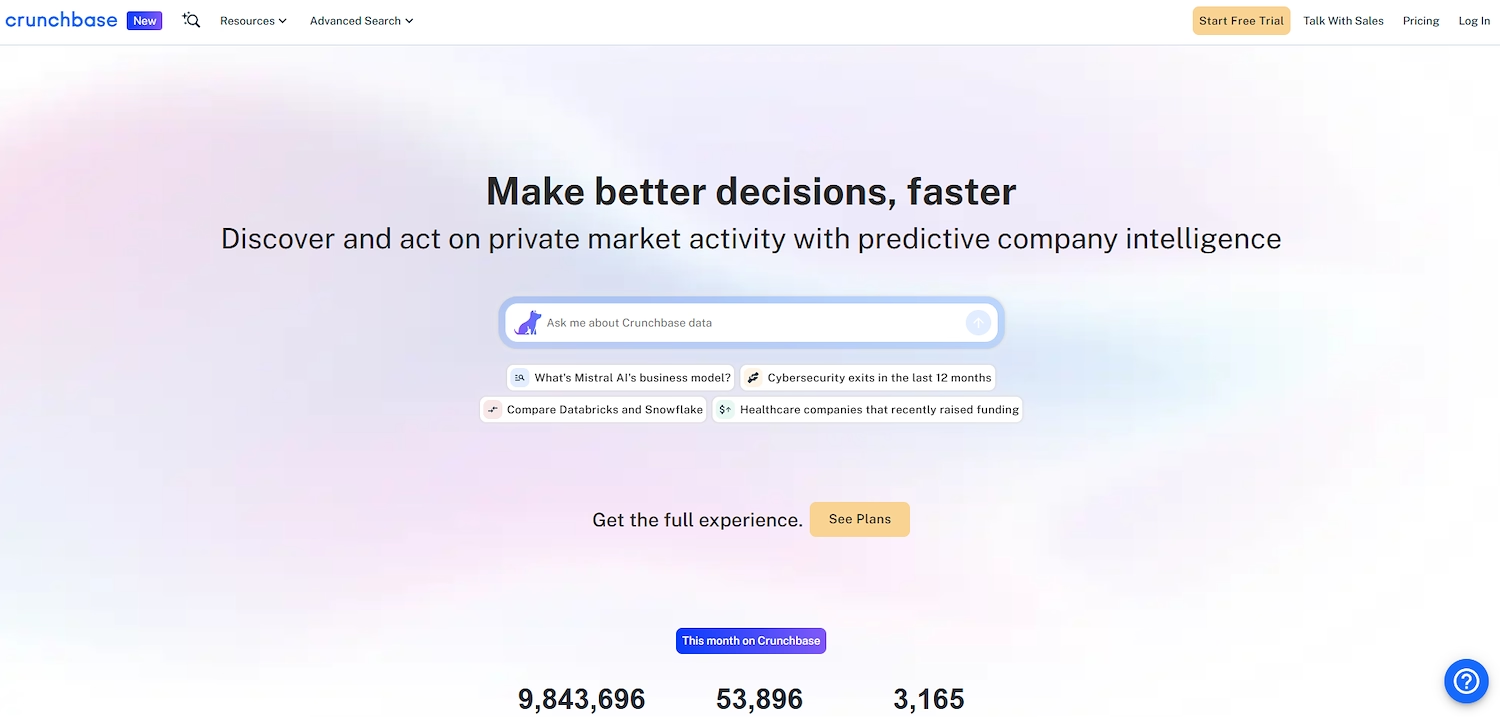
Crunchbase is a business information platform with data on private and public companies. Sales teams use it to find prospects and follow market signals. The service helps identify accounts that show intent to buy, which turns company research activity into a list of potential leads.
Crunchbase's Main Features
- Builds prospect lists using company and contact data.
- Filters and segments data to create targeted company lists.
- Provides industry research for market analysis and trend identification.
How Crunchbase Compares to Octolane
Average Review score: 4.5/5 stars based on 377 G2 reviews.
- Crunchbase provides industry research for market analysis, which is different from Octolane's focus on identifying companies that visit your website.
- It allows users to filter and segment company data to build targeted prospect lists, a different approach from Octolane, which identifies leads from your website traffic.
- This tool offers contact data for individuals, which provides a direct path for outreach. In comparison, Octolane primarily identifies the company visiting your site.
- The platform includes detailed funding information for private companies. This helps teams qualify accounts based on financial signals, a feature distinct from Octolane's visitor identification.
Potential Drawbacks of Crunchbase
- Crunchbase functions as a research database. It does not identify anonymous companies on your website in real time, a core feature of Octolane.
- The tool relies on a large database of company information. Some users find that this data can sometimes be out of date, which contrasts with Octolane's real-time approach.
- Its platform requires users to actively search and build prospect lists. This is a different workflow compared to Octolane, which automatically surfaces leads based on who visits your website.
Pricing and Cost-Effectiveness
Crunchbase offers transparent pricing with its Pro plan at $99 per user per month, providing predictable costs for individuals or small teams. This contrasts with Octolane, which does not list pricing publicly. For details on enterprise plans, visit the Crunchbase website.
9) UpLead
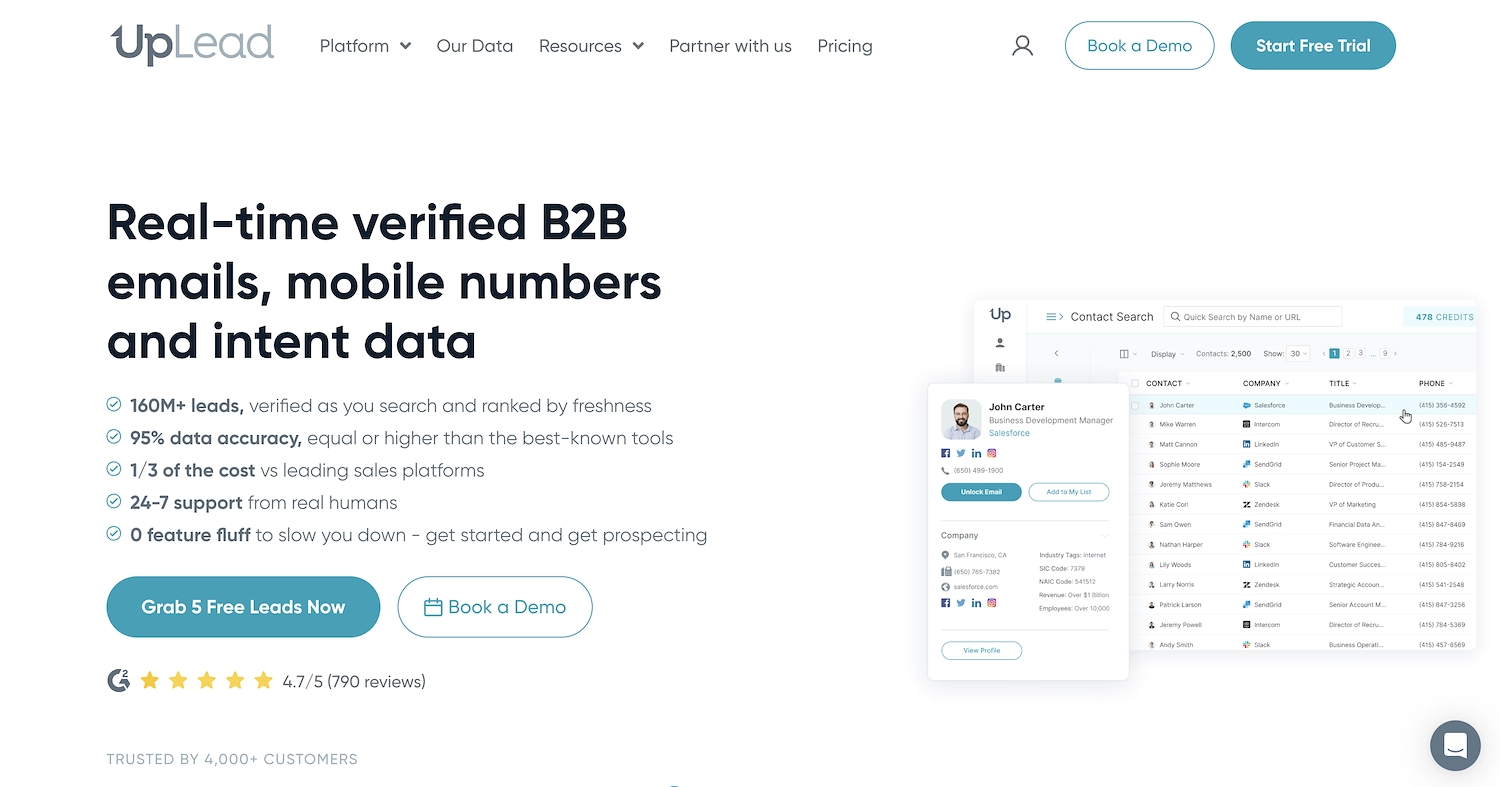
UpLead is a B2B prospecting platform that provides verified contact and company data. Teams use the service to find prospects and enrich records. The platform identifies anonymous companies that visit your website, which helps turn web traffic into a list of potential leads for sales outreach.
UpLead's Main Features
- Provides access to contact and company data using over 50 search filters to find in-market buyers.
- Verifies emails in real time to ensure data accuracy for outreach campaigns.
- Enriches contact and company records to maintain clean and complete data.
- Integrates with CRMs like Salesforce and HubSpot to automate data workflows.
How UpLead Compares to Octolane
Average Review score: 4.7/5 stars based on 797 G2 reviews.
- UpLead verifies emails in real time to ensure data accuracy. This is different from Octolane, which identifies the company visiting your site but does not provide verified contact details.
- It provides over 50 search filters to build prospect lists. This allows for active lead generation, a different approach from Octolane, which identifies visitors already on your website.
- The tool enriches existing contact and company records to keep data complete. This function is distinct from Octolane, which primarily sends new visitor data to a CRM and does not perform data enrichment.
- This platform uses intent data to help find in-market buyers. This offers a broader view of a prospect's buying journey compared to Octolane, which focuses only on the signal of a website visit.
Potential Drawbacks of UpLead
- UpLead is a broad platform with many tools. For teams that only need to identify website visitors, the system can feel complex compared to Octolane's single function.
- The platform relies on a large contact database, but some users report that this data can be outdated. This is different from Octolane, which identifies companies from live website traffic.
- It identifies the company that visits your site. The platform does not provide deep behavioral analytics on what visitors do on the page, a feature that is central to Octolane.
Pricing and Cost-Effectiveness
UpLead provides transparent pricing with a free trial and paid plans that start at $99 per month. This tiered structure offers predictable costs, unlike Octolane, which does not list pricing publicly. For the most current pricing, visit UpLead's official website.
10) Hunter
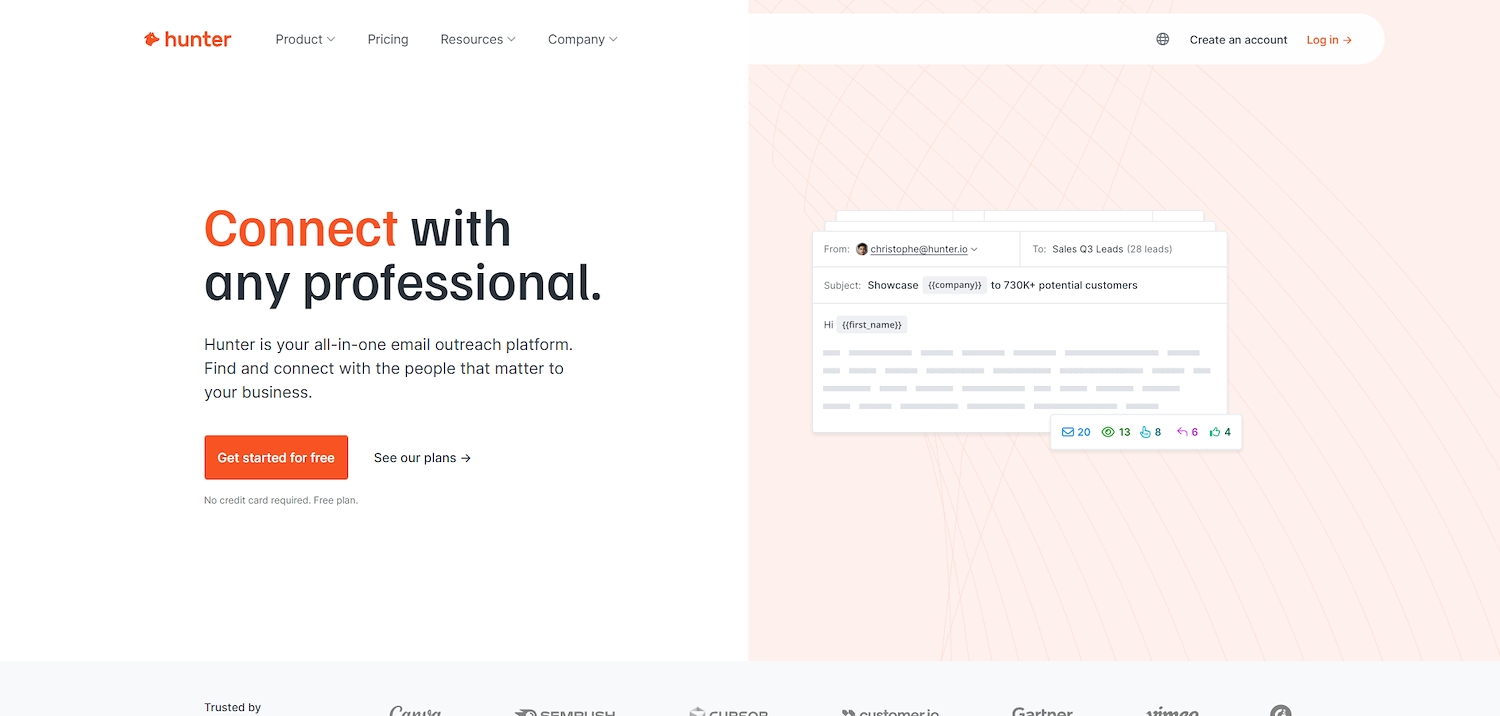
Hunter is a tool that finds and verifies professional email addresses. Sales and marketing teams use it to build contact lists for outreach. The platform can search for contacts by company domain or a person's name to supply specific information for engagement campaigns.
Hunter's Main Features
- Finds and verifies professional email addresses from specific domains or companies.
- Includes a cold email platform to send outreach campaigns directly from the tool.
- Segments and filters data to build targeted lead lists for outreach.
- Provides internationalization with support for German, French, and Italian.
How Hunter Compares To Octolane
Average Review score: 4.4/5 stars based on 592 G2 reviews.
- Hunter finds and verifies professional email addresses for outreach. This is different from Octolane, which identifies the visiting company but not specific, verified contacts.
- It includes a cold email platform to send outreach campaigns. In comparison, Octolane identifies leads but does not have a built-in tool for engagement.
- The tool lets you search for contacts by company domain. This provides an active way to build lists, unlike Octolane, which identifies visitors who come to your site.
- This platform supports multiple languages, including German, French, and Italian. This feature provides more flexibility for global teams than Octolane.
Potential Drawbacks of Hunter
- Hunter primarily finds email addresses. It does not identify anonymous companies visiting your website, a core feature of Octolane. This may result in missed opportunities from interested but unknown site traffic.
- The platform does not provide behavioral analytics. Compared to Octolane, it cannot track which pages a visitor views or for how long. This makes it harder to understand a prospect's specific interests.
- Its service centers on a database of indexed emails, which some users find can be out of date. Octolane, in contrast, gives real-time data on who is currently on your site.
Pricing and Cost-Effectiveness
Hunter offers transparent pricing with a free plan and paid tiers starting at $49 per month. This provides predictable costs, unlike Octolane, which requires a custom quote. For the most current pricing, visit Hunter's official website.
Which One Should You Go With?
Choosing an Octolane alternative depends on many factors, from your budget to your team's specific needs. This guide reviewed several options to help you compare features and make an informed decision.
For teams that want to use AI agents for sales, 11x is an option to consider. Our platform uses digital workers to find prospects, handle outreach, and qualify leads, which frees up your sales team to focus on closing deals.




